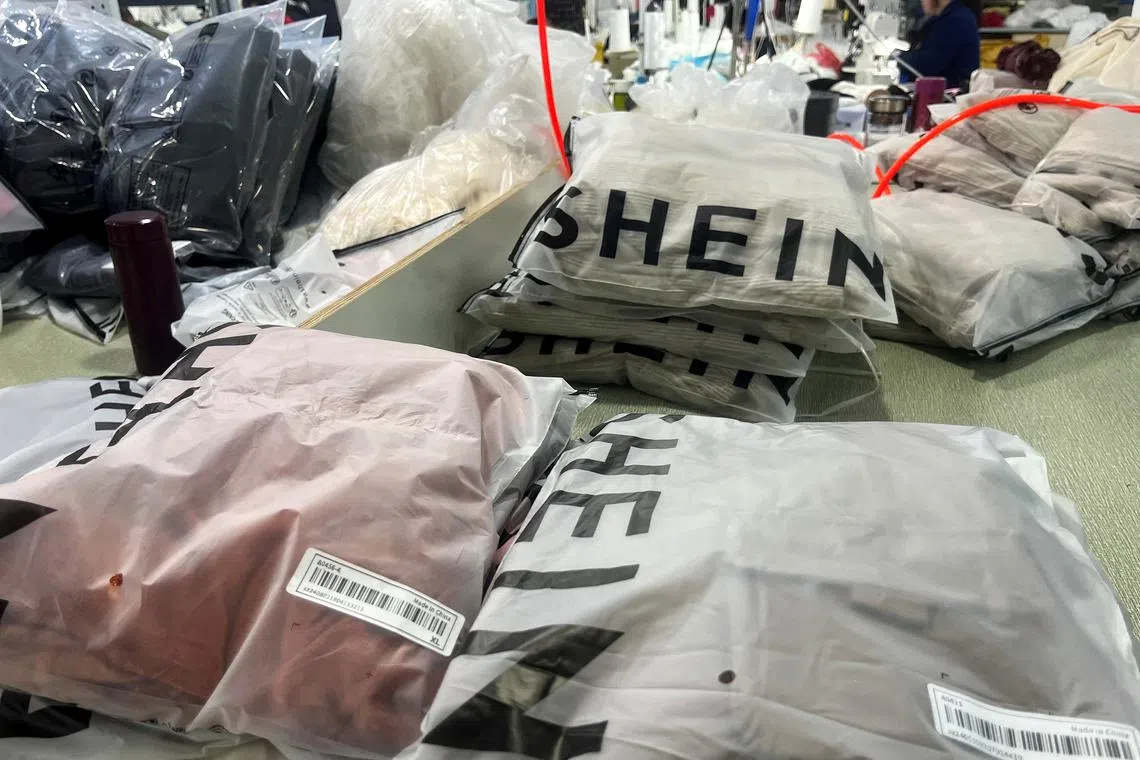What the end of the de minimis exemption means for US shoppers and businesses
Sign up now: Get ST's newsletters delivered to your inbox

Retailers such as Shein and Temu, which ship primarily from China, will be affected by the end of the de minimis exemption.
PHOTO: REUTERS
Follow topic:
NEW YORK - The US administration on Aug 29 ended duty-free imports of packages worth less than US$800 (S$1,027.40), known as the “de minimis” exemption, a decision that increases costs for retailers around the world selling to the US and will likely cause prices to rise for American shoppers.
US President Donald Trump announced on July 30 the repeal of the duty-free treatment
With this, the administration has expanded a decision in May to impose tariffs on these shipments from China and Hong Kong
Here is what the latest step means for US buyers, as well as some small US businesses that work with overseas suppliers.
What are the reasons?
The Trump administration has cracked down on de minimis because it says the exemption has enabled traffickers to easily send parcels containing fentanyl into the country.
US retailers and industry groups also opposed the exemption in the belief it gave an unfair advantage to foreign e-commerce companies, such as Shein and Temu, as well as some third-party sellers on Amazon. Amazon, Shein and Temu declined to comment.
Prices of merchandise at Walmart or Target already reflect tariffs paid by the retailers when they import the goods, making them comparatively more expensive.
What does it mean?
The de minimis exemption enabled a cross-border e-commerce surge as US shoppers snapped up bargains, including US$12 dresses on Temu. Until May 2, orders landed on their doorsteps free of duties, provided their packages were valued at less than US$800.
In fiscal year 2024, 1.36 billion shipments arrived under de minimis with a declared value of US$64.6 billion.
According to US government data, about 73 per cent of de minimis packages entering the US originated from China in 2024.
Letters and gifts worth less than US$100 sent to the US by individuals will still be exempt from duties under the new rules.
Which countries are most affected?
Canada, Mexico and the UK are the next biggest senders, according to CBP figures. Logistics provider Red Stag Fulfilment said other significant sources include India, South Korea, Thailand and Vietnam.
Since the China exemption was eliminated on May 2, de minimis volumes have fallen by about a third, Red Stag said.
Small British businesses selling online to US shoppers have already alerted customers to price increases.
Sewing pattern and fabric company Merchant & Mills, for example, announced in an Instagram post that it would increase its US prices by 15 per cent to cover duties.
What are the ripple effects?
The change has caused turmoil in postal services across the world, with Australia Post, Germany’s Deutsche Post, Japan Post, Korea Post and others pausing shipments to the US as they work to adapt.
Britain’s Royal Mail resumed shipments on Aug 28, saying customers can send parcels using a “postal delivery duties paid” service, paying any duties up front, as well as a handling fee to cover additional costs of clearance into the US.
“It’s very challenging for the post to go into an environment where it has US duties, when it has never collected duties,” said Mr Clint Reid, founder and chief executive of Zonos, whose software helps businesses calculate, collect and remit duties.
US Customs and Border Protection said it was taking the necessary actions to implement the order.
The new tariff regime will also increase paperwork for sellers, as US customs requires information on the origin and type of goods in packages.
In February, the Trump administration paused its initial ban on de minimis shipments from China as packages piled up at US customs, and granted more time before the change took effect.
What does it mean for online retailers?
E-commerce giants Shein and Temu have had time to adapt to the change since May. While prices on Shein have started to increase, the latest change may put it in a better position than some rivals, said Professor Jin Yao of Miami University.
“It is now economical to ship out of China on a relative basis, simply because the cost of shipping direct from other countries has also risen,” Prof Jin said.
How are small businesses affected?
It is harder for small businesses to absorb tariffs, and some plan to increase their prices to offset tariff costs.
Platforms like eBay and Etsy, where individuals and small businesses sell anything from vintage soccer shirts to electronics, have advised sellers to communicate with their customers about tariff-related price increases. REUTERS

